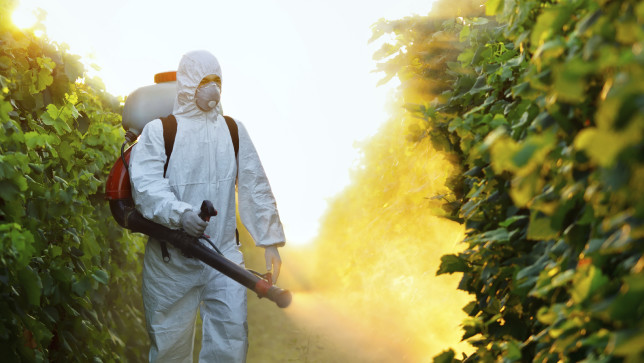About three million tonnes of agricultural pesticides are used across the globe each year, yet little is known about where or in which environments these chemicals end up after their initial application.

A global study published Thursday in Nature, which analysed the geographic distribution of 92 of the most commonly used agricultural pesticides, found that approximately 70,000 tonnes of potentially harmful chemicals leach into aquifers each year, impacting ecosystems and freshwater resources.
Associate Professor Federico Maggi, the study’s lead author from the University of Sydney’s School of Civil Engineering, said: “Our study has revealed that pesticides wander far from their original source. In many cases these chemicals end up a long way downstream and often, though in much smaller amounts, all the way to the ocean.”
The study showed that about 80 percent of applied pesticides degrade into daughter molecules – or byproducts – into soil surrounding crops.
“This degradation of pesticides often occurs as a ‘cascade’ of molecules into the surrounding environment, which can persist in the environment for a long time and can be just as harmful as the parent molecule or applied pesticide. One such example is glyphosate. Although it is highly degradable, it breaks down into a molecule known as AMPA that is both highly persistent and toxic,” said Associate Professor Maggi.
While the study found that only a fraction of pesticides enter river systems after field application, once in the water most of the active ingredients end up in the ocean, with potential negative impacts on marine wildlife and coral reefs. This puts at risk the very basis of marine and freshwater food chains.
“On paper, 0.1 percent leaching into fresh waterways might not sound like much,” said Associate Professor Maggi. “But it only takes a tiny amount of pesticides to have a negative impact on the environment.”
The study showed that 730 tonnes of pesticides enter rivers each year, with about 13,000 kilometres of rivers reaching chemical concentrations above safety limits for a number of aquatic plants and invertebrates, with poorly understood consequences on rivers’ ecosystems.
Dr Fiona Tang, a lecturer in water engineering at Monash University and paper co-author said: “Just because we don’t see pesticide residues in soil and water doesn’t mean they’re not there, impacting critical systems on land, rivers and oceans.”
Paper co-author, Dr Francesco Tubiello, Senior Environmental Statistician at the United Nations’ Food and Agriculture Organisation said: “We must urgently adopt sustainable management strategies to promote reductions in field applications of harmful pesticides and set in place systems to effectively monitor their use under the 2030 Sustainable Development Agenda.”
The research team used a large collection of publicly accessible geospatial data to conduct the study.
However, the authors say the paper is a conservative estimate because not all pesticides were included in the analysis. They did not analyse legacy pesticides and those used in aquaculture, private dwellings and public spaces, meaning the risk exposure of ecosystems and people to these chemicals could be higher.
Associate Professor Maggi last week co-authored a separate paper in Nature Ecology and Evolution that outlined recommendations to reduce pesticide use, including calling for a reliable set of indicators and improved monitoring.
He and the paper’s co-authors argue that targets for lowering pesticide pollution should be focused on decreasing risk, including reducing amounts and toxicity, because some organisms are at high risk from very toxic pesticides, even when used in low quantities.
“It is important that national authorities disclose statistics on the use of agricultural inputs, be they fertilisers or pesticides, given the effect they have on the environment and ecosystem service,” he said.
Associate Professor Maggi said a global reduction in pesticide use while maintaining food security was possible as long as such initiatives were designed and implemented in consultation with food producers.
“Globally, there is a lot of room to increase efficiencies and yield while still supporting an abundant food supply through new technology and modern crop management practices,” he said.



















Educative info.we have to find sustainable way of using pesticides without reducing agricultural produce.un and other organisation on the same vision should emphasize the reduction f the use of pesticides.
One of the most ecologically damaging agricultural myths is that we can’t produce enough food without the use of pesticides…so they’re a ‘necessary evil’.
The reality is that we can reliably produce as much and often times more food of better nutritional value without pesticides through regenerative organic practices. Among numerous studies, the recent Rodale Institute 40 year crop comparison research clearly demonstrates this rodaleinstitute.org/science/farming-systems-trial/
As a soils consultant and eco-nutritionist, I assert that there is an additional serious impact from pesticide use. That is a massive decline in vitamin and mineral content of the crop when we nuke soil microbes and collapse soil function through the application of synthetic pesticides and fertilisers. We simply can’t grow nutrient dense, healing foods, nor grow soil carbon levels if we apply pesticides. It physically can’t happen. Pesticides mean we lose health on numerous important fronts.
pesticides are POISONS targeted at killing competitors and unwanted plants. many so called pests are actually needed and have an important role in nature! all poisons put into nature will come back around and damage us! all life is connected, and what poisons one will harm all! use of a pesticide should be illegal, unless there is a problem that can’t be fixed otherwise! the huge increase in serious diseases like cancer & diabetes, has occurred since we started using pesticides & insecticides! ban poisons now!!!